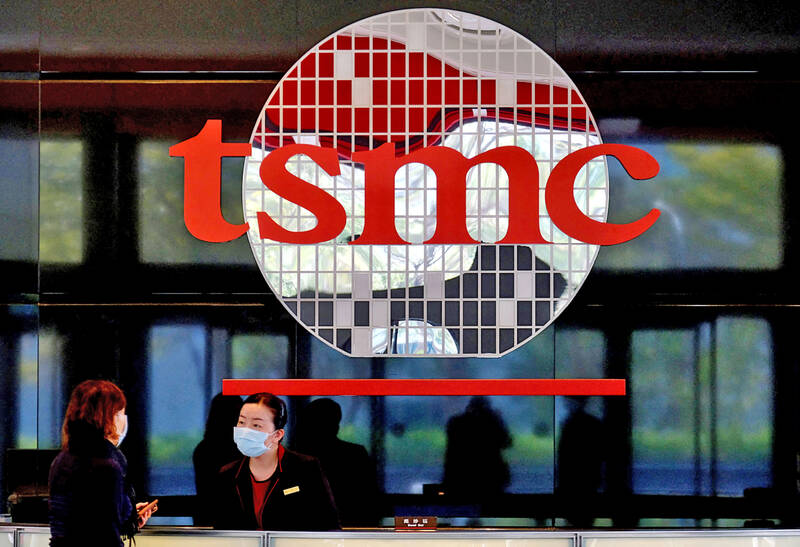Taiwan Semiconductor Manufacturing Co (TSMC, 台積電) yesterday held its first board of directors meeting in the US, at which it did not unveil any new US investments despite mounting tariff threats from US President Donald Trump.
Trump has threatened to impose 100 percent tariffs on Taiwan-made chips, prompting market speculation that TSMC might consider boosting its chip capacity in the US or ramping up production of advanced chips such as those using a 2-nanometer technology process at its Arizona fabs ahead of schedule.
Speculation also swirled that the chipmaker might consider building its own advanced packaging capacity in the US as part of its efforts to avert potential heavy US tariffs.

Photo by Sam Yeh, AFP
However, in a statement, TSMC did not address the issue nor offer an update on the company’s chip production plans in Arizona.
The world’s biggest contract chipmaker had said earlier that it plans to build three fabs in Arizona for a total investment of US$65 billion, with the third fab to produce chips using 2-nanometer or more advanced technology by the end of this decade.
TSMC, which is the sole artificial intelligence (AI) supplier to Nvidia Corp, has repeatedly said that it builds capacity overseas due to customers’ needs, and if customers have “very high demand, we build more fabs with necessary government support.”
The board of directors yesterday approved a proposed cash dividend distribution of NT$4.5 per share for the final quarter last year, flat from the previous quarter, although TSMC reported record earnings per share of NT$14.45 in the quarter.
The fourth-quarter cash dividend distribution represented about a 31.14 percent payout ratio.
Last year as a whole, TSMC shareholders would receive a total of NT$17 per share in cash dividends.
The board yesterday also approved employees’ business performance bonuses and profit sharing bonuses totaling NT$140.59 billion (US$4.28 billion) for last year, an all-time high.
It also approved capital appropriations of approximately US$17.14 billion to meet long-term capacity plans based on market demand forecasts and the company’s technology development road map, the statement said.
The capital expenditure would be spent on installation and upgrades of advanced technology process capacity, and advanced packaging, mature or specialty technology capacity, as well as fab construction and installation of fab facility systems, it said.
The board also approved a maximum capital injection of US$10 billion to TSMC Global Ltd, a wholly owned subsidiary of TSMC, with an aim to reduce foreign-exchange hedging costs.
The board approved the promotion of human resources senior director P.H. Chen (陳培宏) to vice president. The promotion came on the heels of recent media speculation that Lora Ho (何麗梅), head of the human resources department, would retire.

Sweeping policy changes under US Secretary of Health and Human Services Robert F. Kennedy Jr are having a chilling effect on vaccine makers as anti-vaccine rhetoric has turned into concrete changes in inoculation schedules and recommendations, investors and executives said. The administration of US President Donald Trump has in the past year upended vaccine recommendations, with the country last month ending its longstanding guidance that all children receive inoculations against flu, hepatitis A and other diseases. The unprecedented changes have led to diminished vaccine usage, hurt the investment case for some biotechs, and created a drag that would likely dent revenues and

Global semiconductor stocks advanced yesterday, as comments by Nvidia Corp chief executive officer Jensen Huang (黃仁勳) at Davos, Switzerland, helped reinforce investor enthusiasm for artificial intelligence (AI). Samsung Electronics Co gained as much as 5 percent to an all-time high, helping drive South Korea’s benchmark KOSPI above 5,000 for the first time. That came after the Philadelphia Semiconductor Index rose more than 3 percent to a fresh record on Wednesday, with a boost from Nvidia. The gains came amid broad risk-on trade after US President Donald Trump withdrew his threat of tariffs on some European nations over backing for Greenland. Huang further

Macronix International Co (旺宏), the world’s biggest NOR flash memory supplier, yesterday said it would spend NT$22 billion (US$699.1 million) on capacity expansion this year to increase its production of mid-to-low-density memory chips as the world’s major memorychip suppliers are phasing out the market. The company said its planned capital expenditures are about 11 times higher than the NT$1.8 billion it spent on new facilities and equipment last year. A majority of this year’s outlay would be allocated to step up capacity of multi-level cell (MLC) NAND flash memory chips, which are used in embedded multimedia cards (eMMC), a managed

CULPRITS: Factors that affected the slip included falling global crude oil prices, wait-and-see consumer attitudes due to US tariffs and a different Lunar New Year holiday schedule Taiwan’s retail sales ended a nine-year growth streak last year, slipping 0.2 percent from a year earlier as uncertainty over US tariff policies affected demand for durable goods, data released on Friday by the Ministry of Economic Affairs showed. Last year’s retail sales totaled NT$4.84 trillion (US$153.27 billion), down about NT$9.5 billion, or 0.2 percent, from 2024. Despite the decline, the figure was still the second-highest annual sales total on record. Ministry statistics department deputy head Chen Yu-fang (陳玉芳) said sales of cars, motorcycles and related products, which accounted for 17.4 percent of total retail rales last year, fell NT$68.1 billion, or